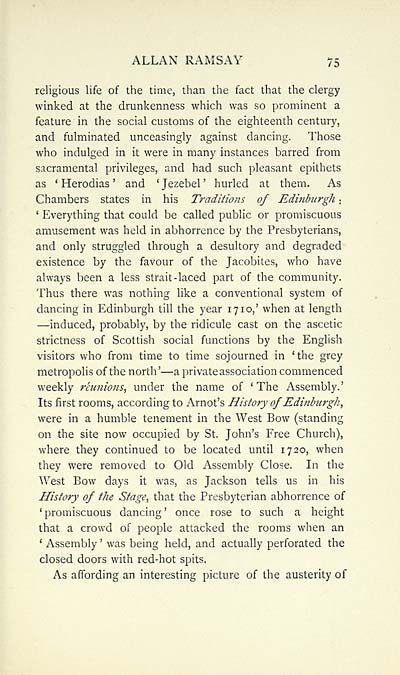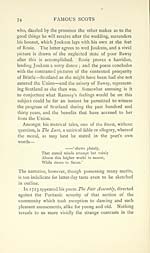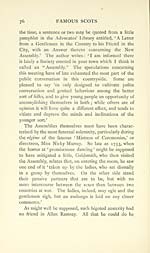Glen Collection of printed music > Printed text > Allan Ramsay
(79) Page 75
Download files
Complete book:
Individual page:
Thumbnail gallery: Grid view | List view

ALLAN RAMSAY 75
religious life of the time, than the fact that the clergy
winked at the drunkenness which was so prominent a
feature in the social customs of the eighteenth century,
and fulminated unceasingly against dancing. Those
who indulged in it w^ere in many instances barred from
sacramental privileges, and had such pleasant epithets
as 'Herodias' and 'Jezebel' hurled at them. As
Chambers states in his Traditions of Edinburgh -,
' Everything that could be called public or promiscuous
amusement was held in abhorrence by the Presbyterians,
and only struggled through a desultory and degraded
existence by the favour of the Jacobites, who have
always been a less strait-laced part of the community.
Thus there was nothing like a conventional system of
dancing in Edinburgh till the year 17 10,' when at length
— induced, probably, by the ridicule cast on the ascetic
strictness of Scottish social functions by the English
visitors who from time to time sojourned in 'the grey
metropolis of the north' — a private association commenced
weekly reunions, under the name of ' The Assembly.'
Its first rooms, according to Arnot's History of Edinburgh,
were in a humble tenement in the West Bow (standing
on the site now occupied by St. John's Free Church),
where they continued to be located until 1720, when
they were removed to Old Assembly Close. In the
West Bow days it was, as Jackson tells us in his
History of the Stage, that the Presbyterian abhorrence of
'promiscuous dancing' once rose to such a height
that a crowd of people attacked the rooms when an
' Assembly ' was being held, and actually perforated the
closed doors with red-hot spits.
As affording an interesting picture of the austerity of
religious life of the time, than the fact that the clergy
winked at the drunkenness which was so prominent a
feature in the social customs of the eighteenth century,
and fulminated unceasingly against dancing. Those
who indulged in it w^ere in many instances barred from
sacramental privileges, and had such pleasant epithets
as 'Herodias' and 'Jezebel' hurled at them. As
Chambers states in his Traditions of Edinburgh -,
' Everything that could be called public or promiscuous
amusement was held in abhorrence by the Presbyterians,
and only struggled through a desultory and degraded
existence by the favour of the Jacobites, who have
always been a less strait-laced part of the community.
Thus there was nothing like a conventional system of
dancing in Edinburgh till the year 17 10,' when at length
— induced, probably, by the ridicule cast on the ascetic
strictness of Scottish social functions by the English
visitors who from time to time sojourned in 'the grey
metropolis of the north' — a private association commenced
weekly reunions, under the name of ' The Assembly.'
Its first rooms, according to Arnot's History of Edinburgh,
were in a humble tenement in the West Bow (standing
on the site now occupied by St. John's Free Church),
where they continued to be located until 1720, when
they were removed to Old Assembly Close. In the
West Bow days it was, as Jackson tells us in his
History of the Stage, that the Presbyterian abhorrence of
'promiscuous dancing' once rose to such a height
that a crowd of people attacked the rooms when an
' Assembly ' was being held, and actually perforated the
closed doors with red-hot spits.
As affording an interesting picture of the austerity of
Set display mode to: Large image | Transcription
Images and transcriptions on this page, including medium image downloads, may be used under the Creative Commons Attribution 4.0 International Licence unless otherwise stated. ![]()
| Special collections of printed music > Glen Collection of printed music > Printed text > Allan Ramsay > (79) Page 75 |
|---|
| Permanent URL | https://digital.nls.uk/91279234 |
|---|
| Description | Scottish songs and music of the 18th and early 19th centuries, including music for the Highland bagpipe. These are selected items from the collection of John Glen (1833 to 1904). Also includes a few manuscripts, some treatises, and other books on the subject. |
|---|
| Description | The Glen Collection and the Inglis Collection represent mainly 18th and 19th century Scottish music, including Scottish songs. The collections of Berlioz and Verdi collected by bibliographer Cecil Hopkinson contain contemporary and later editions of the works of the two composers Berlioz and Verdi. |
|---|

